最新小学英语语法肯定句变一般疑问句、特殊疑问句的用法归纳总结
小学英语肯定句、否定句、一般疑问句和特殊疑问句的相互转换2

小学英语肯定句、否定句、一般疑问句和特殊疑问句的相互转
换2
没有am, is, are的句子,
肯定句变否定句:在主语后面加上do not或者does not,其余按顺序照抄动词用原形。
肯定句变一般疑问句:在句首加do或者does并大写,其余照抄。
注意:动词用原形。
肯定句变特殊疑问句(就划线部分提问):分3步骤。
第一步:先变一般疑问句。
第二步:找合适的特殊疑问词代替划线部分。
第三步:特殊疑问词提前放到句首,并大写,其余按顺序照抄,省略划线部分。
注意:1.一定先变一般疑问句。
但是,如果问的是主语或主语的定语时,语序不变,为'特殊疑问词(+主语)+陈述句'。
2.划线部分不能在特殊疑问句中出现。
非单三时用do, 单三时用does。
非单三肯定句:I like English.
一般疑问句:Do you like English?
否定句:I do not like English.
单三肯定句:He likes English.
一般疑问句:Does he like English?
否定句:He does not like English.
就划线部分提问:I like English.
第一步:先变一般疑问句 Do you like English?
第二步:找合适的特殊疑问词代替划线部分Do you like what?
第三步:特殊疑问词提前放到句首,并大写,其余按顺序照抄,省略划线部分。
What do you like?。
小学英语肯定句、否定句、一般疑问句和特殊疑问句的详解

小学英语肯定句、否定句、一般疑问句和特殊疑问句的详解一、be动词:am, is, are二、肯定句、否定句、一般疑问句和特殊疑问句定义1.肯定句:表示肯定的意思, 即不含有否定词“不”。
比如:我是一个学生 I am a student.他去上学 He goes to school.2.否定句:表示否定的意思。
比如:我不是一个男孩。
I am not a boy他不去上学 He does not go to school.3. 一般疑问句:回答为“是yes”或者“否no”的问句。
非单三时用do, 单三时用does肯定句:I like English.否定句:单三肯定句:He likes English.like English?否定句:like English.3.动词过去式的句子分两类,was\were 和动词过去式有 was,were 改为否定句,直接在后面加 not ,改为一般疑问句把 was were 直接提前,有 I we 改为 youI was a teacher.I was not a teacher.(A.Morning !B.Hello !C.Hi !( )2. Nice to see you again ! .A.How are you ?B.Nice to see you , too .C.How do you do ?( )3.Good night,mom !A.Night !B.Good night !C.Good evening .( )4.How do you do ?A.How are you ?B.Fine,thanks .C.How do you do ?( )5.How many story books do you have ?((((( )10. ? Her name is Chen Jie.A.What’s your name ?B.What’s she name ?C.What’s her name ?( )11. ? I like Chinese,math and English.A.What classes do you like?B.What do you like?C.What are you like ?( )12. ? We have English and P.E.A.What do you have on Mondays ?B.What do you have ?C.What do you have on Monday?( )13. ? It’s Monday.((((A.hasB.amC.have( )18.What’s Chinese teacher like ?A.youB.yourC.you’re( )19.My P.E.teacher is thin.A.tooB.soC.very( )20.There are days in a week.A.sixB.sevenC.eight( )21.There are month(月)in a year(年).((((六年级英语测试题Class: Name:( )1. How are you ?A.Fine,thanks.B.Yes,it is.C.How are you ?( )2. Nice to meet you !A.Fine,thank you.B.OK.C.Nice to meet you ,too !( )3. How do you go to school ?A.I go to Canada by plane.B.I go to school by bike.C.What about you ?(( office. (((A.Next to the cinema.B.Thank you .C.You’re welcome.( )9. Excuse me ,is there a cinema near here ?A.Yes,there is .B.No,it’s not far.C.It’s near the post office.( )10.? ? It’s near the post office.A.Yes,there is .B.No,it’s not far.C. Where is the library?( )11. ? It’s next to the hospital.A. Where is the cinema ,please ?B.Is it far ?C.Go straight.( )12. How can I get to the hospital ?((((( )17. Is it far ?A.No,it is .B.Yes , it is .C.Yes,it isn’t. ( )18. do you go to school ?A.WhatB.WhereC.How( )19. I go to school bike.A.onB. byC.get( )20. Can I go foot ?A.byB.atC.on (((((A.WhereB.HowC.When四年级英语测试题Class: Name:( )1.Good afternoon !A.Hello!B.Hi !C.Afternoon !( )2.Nice to see you again !A.How are you ?B.Hello !C.Nice to see you , too.( )3.Good night,moom !A.Good evening !B.Good night !C.Night !( )4.How are you ?A.Fine,thank you .B.I am 10.C.Nine .( )5.How do you do ?A.Fine ,Thank you .B.How are you ?C.How do you do ?( )6.How old are you ?A.How are you ?B.I am 11.C.I have 11.( )7. ? I have 23.A.How many books do you have ?B.How many books can you see?C.How many book do you have ?( )8. ? I can see 6.A.How many lights do you have ?B.How many lights can you see ?C.How many light can you see ?( )21.There a bee in our classroom.A. isB.areC.am( )22. have a new schoolbag. schoolbag is heavy.A.I , myB.I ,MyC.My , I( )23.Put your English book your head.A.atB.inC.on( )24.There many books in the desk.A.amB.isC.are( )25.How many do you have ? A.pencil B.pencils C.pencils. 三年级英语测试题Class: Name:( )1.当向别人打招呼时,应该说:A.Hello.B.Good morning .( )2.How are you ? 的正确答语是:B.I’m fine,thank you .( )3.当想知道别人的名字时,应该说: A.What’s your name ? B.See you. ( )4.字母K的小写是:A.kB.( )5.Nice to meet you 的意思是:A.见到你很高兴。
小学英语肯定句、否定句、一般疑问句和特殊疑问句的详解

小学英语肯定句、否定句、一般疑问句和特殊疑问句的详解小学英语肯定句、否定句、一般疑问句和特殊疑问句的详解一、be动词:am, is, are二、肯定句、否定句、一般疑问句和特殊疑问句定义1.肯定句:表示肯定的意思, 即不含有否定词“不”。
比如:我是一个学生I am a student.他去上学He goes to school.2.否定句:表示否定的意思。
比如:我不是一个男孩。
I am not a boy他不去上学He does not go to school.3. 一般疑问句:回答为“是yes”或者“否no”的问句。
比如:你是一个学生吗?Are you a student?你喜欢英语吗?Do you like English?4. 特殊疑问句:回答不是“是yes”或者“否no”的问句,根据提问内容具体回答。
比如:现在几点了?What’s the time?哪一支笔是你的?Which is your pen?三、肯定句、否定句、一般疑问句和特殊疑问句的相互转换肯定句变否定句:在am, is, are后面加上not,其余按顺序照抄。
肯定句变一般疑问句:把am, is, are提前放到句首并大写Am, Is, Are,其余照抄。
肯定句变特殊疑问句(就划线部分提问):分3步骤第一步:先变一般疑问句第二步:找合适的特殊疑问词代替划线部分第三步:特殊疑问词提前放到句首,并大写,其余按顺序照抄,省略划线部分。
注意:1.如:Li ming 's not here today. Who's not here today? 今天谁没来?2.划线部分不能在特殊疑问句中出现。
例如:1.肯定句、否定句和一般疑问句的互换肯定句:This is a book.否定句:一般疑问句:Is this a book?肯定回答:Yes, it is.否定回答:No, it isn’t.2.就划线部分提问(变特殊疑问句)This is a book.第一步:变一般疑问句Is this a book?第二步:找合适的特殊疑问词Is this what ?第三步:特殊疑问词提前放到句首,并大写,其余按顺序照抄,省略划线部分。
小学英语肯,否,一般,特殊句型转换完美版
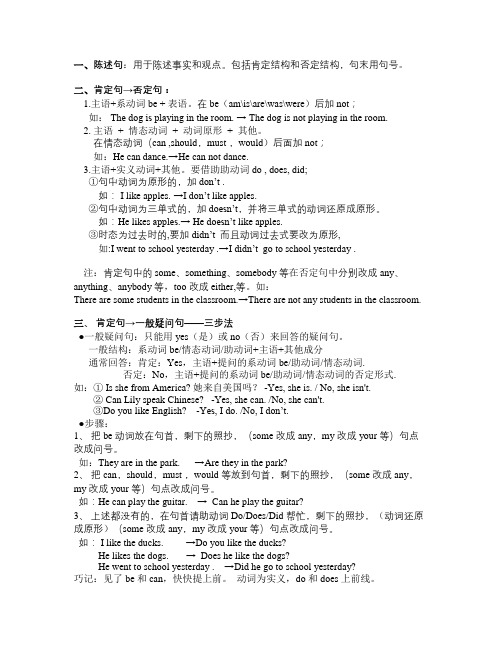
一、陈述句:用于陈述事实和观点。
包括肯定结构和否定结构,句末用句号。
二、肯定句→否定句:1.主语+系动词be + 表语。
在be(am\is\are\was\were)后加not;如:The dog is playing in the room. → The dog is not playing in the room.2. 主语+ 情态动词+ 动词原形+ 其他。
在情态动词(can ,should,must ,would)后面加not;如:He can dance.→H e can not dance.3.主语+实义动词+其他。
要借助助动词do , does, did;①句中动词为原形的,加don’t .如: I like apples. →I don’t like apples.②句中动词为三单式的,加doesn’t,并将三单式的动词还原成原形。
如:He likes apples.→ He doesn’t like apples.③时态为过去时的,要加didn’t而且动词过去式要改为原形,如:I went to school yesterday .→I didn’t go to school yesterday .注:肯定句中的some、something、somebody等在否定句中分别改成any、anything、anybody等,too改成either,等。
如:There are some students in the classroom.→There are not any students in the classroom.三、肯定句→一般疑问句——三步法●一般疑问句:只能用yes(是)或no(否)来回答的疑问句。
一般结构:系动词be/情态动词/助动词+主语+其他成分通常回答:肯定:Yes,主语+提问的系动词be/助动词/情态动词.否定:No,主语+提问的系动词be/助动词/情态动词的否定形式.如:① Is she from America? 她来自美国吗? -Yes, she is. / No, she isn't.② Can Lily speak Chinese? -Yes, she can. /No, she can't.③Do you like English? -Yes, I do. /No, I don’t.●步骤:1、把be动词放在句首,剩下的照抄,(some 改成any,my改成your等)句点改成问号。
小学英语一般疑问句和特殊疑问句总结
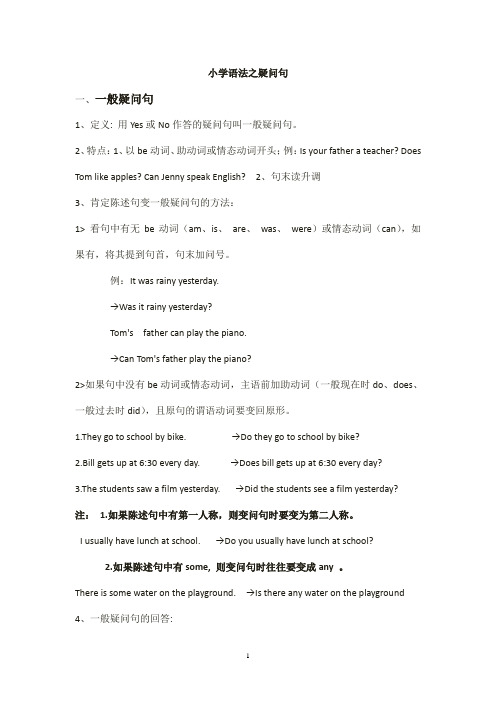
小学语法之疑问句一、一般疑问句1、定义: 用Yes或No作答的疑问句叫一般疑问句。
2、特点:1、以be动词、助动词或情态动词开头;例:Is your father a teacher? Does Tom like apples? Can Jenny speak English? 2、句末读升调3、肯定陈述句变一般疑问句的方法:1> 看句中有无be动词(am、is、are、was、were)或情态动词(can),如果有,将其提到句首,句末加问号。
例:It was rainy yesterday.→Was it rainy yesterday?Tom's father can play the piano.→Can Tom's father play the piano?2>如果句中没有be动词或情态动词,主语前加助动词(一般现在时do、does、一般过去时did),且原句的谓语动词要变回原形。
1.They go to school by bike. →Do they go to school by bik e?2.Bill gets up at 6:30 every day. →Does bill gets up at 6:30 every day?3.The students saw a film yesterday. →Did the students see a film yesterday?注: 1.如果陈述句中有第一人称,则变问句时要变为第二人称。
I usually have lunch at school. →Do you usually have lunch at s chool?2.如果陈述句中有some, 则变问句时往往要变成any 。
There is some water on the playground. →Is there any water on the playground 4、一般疑问句的回答:肯定回答Yes,主语+ be/can/ do,does,did否定回答No, 主语+ be/can/ do,does,did的not否定形式缩写.。
英语肯定句、否定句、一般疑问句和特殊疑问句的详解!
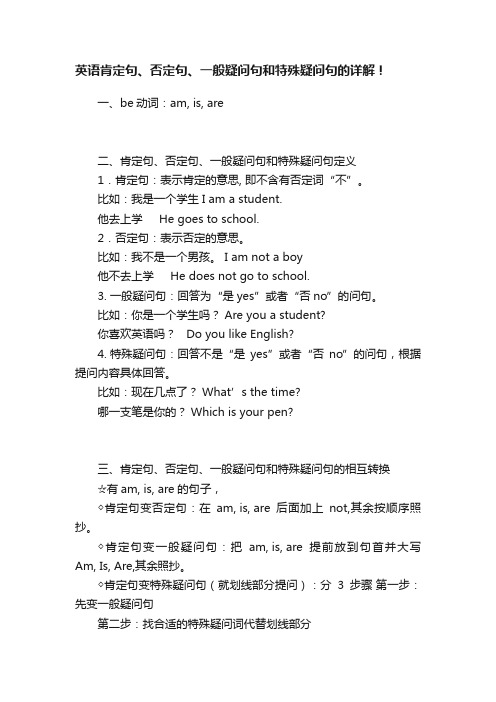
英语肯定句、否定句、一般疑问句和特殊疑问句的详解!一、be动词:am, is, are二、肯定句、否定句、一般疑问句和特殊疑问句定义1.肯定句:表示肯定的意思, 即不含有否定词“不”。
比如:我是一个学生 I am a student.他去上学 He goes to school.2.否定句:表示否定的意思。
比如:我不是一个男孩。
I am not a boy他不去上学 He does not go to school.3. 一般疑问句:回答为“是yes”或者“否no”的问句。
比如:你是一个学生吗? Are you a student?你喜欢英语吗? Do you like English?4. 特殊疑问句:回答不是“是yes”或者“否no”的问句,根据提问内容具体回答。
比如:现在几点了?What’s the time?哪一支笔是你的? Which is your pen?三、肯定句、否定句、一般疑问句和特殊疑问句的相互转换☆有am, is, are的句子,◇肯定句变否定句:在am, is, are后面加上not,其余按顺序照抄。
◇肯定句变一般疑问句:把am, is, are提前放到句首并大写Am, Is, Are,其余照抄。
◇肯定句变特殊疑问句(就划线部分提问):分3步骤第一步:先变一般疑问句第二步:找合适的特殊疑问词代替划线部分第三步:特殊疑问词提前放到句首,并大写,其余按顺序照抄,省略划线部分。
注意:1.一定先变一般疑问句。
但,如果问的是主语或主语的定语时,语序不变,为'特殊疑问词( 主语) 陈述句'。
如:Li ming 's not here today. Who's not here today? 今天谁没来?2.划线部分不能在特殊疑问句中出现。
when 什么时间(问时间)what date 什么日期问具体日期who 谁(问人)what place什么地点问具体地址whose 谁的问主人how …怎么样问情况where 在哪里问地点how old 多大问年龄which 哪一个问选择how many 多少问数量why 为什么问原因how much 多少问价钱what 什么问东西how about …怎么样问意见what time 什么时间问时间how far 多远问路程what colour 什么颜色问颜色how long 多长问时间what about…怎么样问意见how soon 多快,多久问时间what day 星期几问星期how often多久问频率例如:1. 肯定句、否定句和一般疑问句的互换肯定句:This is a book.否定句:This is not a book.一般疑问句:Is this a book?肯定回答:Yes, it is.否定回答:No, it isn’t.2.就划线部分提问(变特殊疑问句)This is a book.第一步:变一般疑问句 Is this a book?第二步:找合适的特殊疑问词 Is this what ?第三步:特殊疑问词提前放到句首,并大写,其余按顺序照抄,省略划线部分。
小学英语四种基本句型肯定句否定句、一般疑问句与特殊疑问句
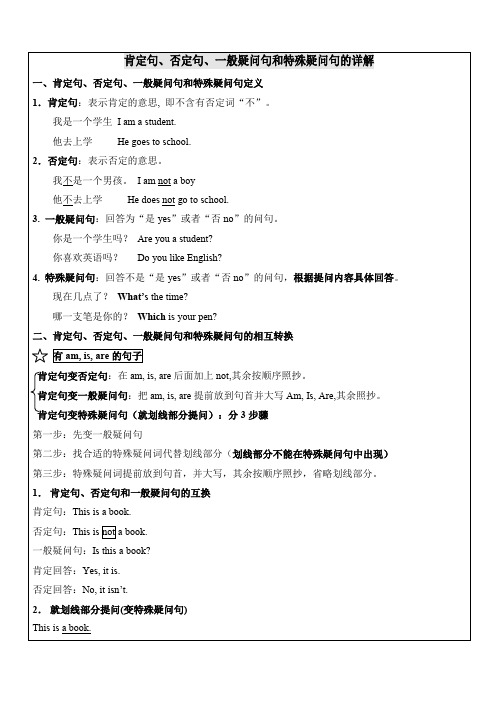
What do you like? 常用特殊疑问词及词组:
when 什么时间(问时间)
what date 什么日期 问具体日期
who 谁(问人)
what place 什么地点问具体地址
whose 谁的 问主人
how …怎么样 问情况
where 在哪里 问地点
how old 多大 问年龄
which 哪一个 问选择
熟记变特殊疑问句时,容易判断错的情况。 1、 数词
表示年龄:He is fifty-five. How old is he ? 表示时间:It’s fifty-five. What’s the time? 表示加法:Six and two is eight. What’s six and two? 表示价格:The shirt is thirty yuan . How much is the shirt? 表示多少:I have three brothers. How many brothers do you have? 2、 姓名和人 表示人名:My name is Gina. What’s your name? 表示人:The woman is Gina. Who is the woman ? 3、 长度和距离 表示距离:It’s five hundred metres away from here. How far is it from here? 表示长度:It’s five hundred metres. How long is it ? 4、 颜色,东西 表示颜色:The shoes are white. What color are the shoes? 表示物:They are white sheep. What are they? 表示颜色:They are white sheep. What color are these sheep? 5、 名词所有格和人 表示名词所有格:She’s Lucy’s sister. Whose sister is she? 表示人:She’s Lucy’s sister. Who is she? 练一练 1 (用特殊疑问词填空): 1、A: _______ is the boy in blue?????????B:He’s Mike. 2、A: _______ wallet is it????????????? B:It’s mine. 3、A: _______ is the diary????????????? B:It’s under the chair. 4、A: _______ is the Chirstmas Day????? B: It’s on the 25th of December.
最新小学英语语法肯定句变一般疑问句、特殊疑问句的用法归纳总结

最新小学英语语法肯定句变一般疑问句、特殊疑问句的用法归纳总结小学语法—疑问句一、疑问句的分类疑问句就是提出疑问的句子。
分为:一般疑问句、特殊疑问句、选择疑问句和反意疑问句四种。
小学阶段不涉及反意疑问句和选择疑问句。
二、一般疑问句以Be动词,情态动词,助动词开头的疑问句,叫一般疑问句。
回答一般用“yes/no”来回答。
读的时候语音音调要上扬。
一般疑问句的结构:构成一般疑问句回答1Be动词在前Is he your father?Yes,he is/No,he isn′t Was she at home yesterday?Yes,she was/No,she wasn′t Are you at home?Yes,I am/No,I am not2情态动词在前Can you play the piano?Yes,I can/No,I can′t Could you do your homework?Yes,I can/No,I can′t3助动词在前Do you do your homework?Yes,I do/No,I don′tDoes she do her homework?Yes,she does/No,she doesn′t Did you do your homework?Yes,I did/No,I didn′tWill you do your homework?Yes,I will/No,I won′tIs she doing her homework.Yes,she is/No,she isn′t注意:回答一般疑问句时,肯定回答用“yes”,否定回答用“no”。
紧跟着的是人称(一般是代词),最后是一般疑问句的第一个词,如果是“no”否定回答还要把它加上not。
eg:Did you do your homework?你做作业了吗?Yes,I did/No,I didn′t(√)是的,我做了/不,我没有Yes,I didn′t(×)No,I did(×)Yes,I do(×)No,I doesn′t(×)三、肯定句如何变一般疑问句肯定句变一般疑问句与改成否定句窍门差不多,也是去找谓语(主要动词),再变化,遇到some要变成any。
英语肯定句变一般疑问句口诀

英语肯定句变一般疑问句口诀如下:
变一般疑问句口认之一
(一) can、be、do、does在前(二)第一(人称)变第二(人称)(三)末尾用问号,语调用升调(四)有some变any
变一般疑间句口诀之二
(一)有can有be,can、be提前(二)没有can、be的,do、does显身手,三单用does,
does后动词还原(三)其他人称do在前
变一般疑问句的方法如下:
(一调,二变,三问号)
当句中有Be(am, is, are)动词的时候,
1、将Be (am,is, are)提前,放于句首(大写)﹔
2、将人称变换,第一人称变第二人称(I→you,we→you,my→your, our→your),第二人称变第一人称(you→I, you→we, your-my, your→our),第三人称不变(一变二,二变一,三不变)
3、在句尾加问号“?”。
小学英语四种基本句型-肯定句、否定句、一般疑问句及特殊疑问句
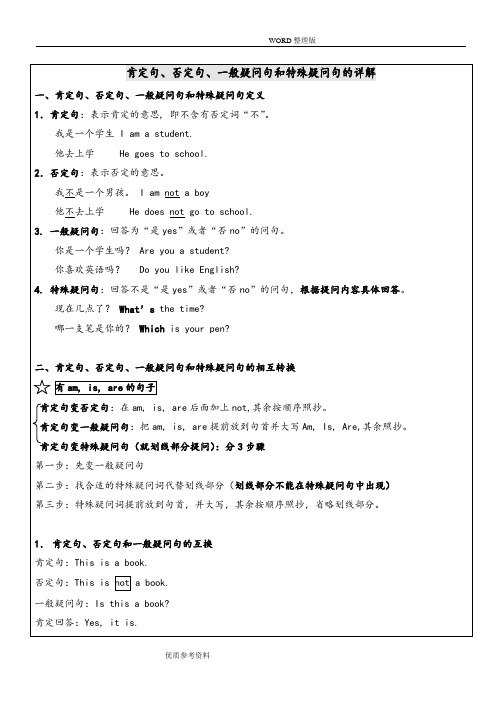
肯定句、否定句、一般疑问句和特殊疑问句的详解
一、肯定句、否定句、一般疑问句和特殊疑问句定义 1.肯定句:表示肯定的意思, 即不含有否定词“不”。
我是一个学生 I am a student. 他去上学 He goes to school. 2.否定句:表示否定的意思。 我不是一个男孩。 I am not a boy 他不去上学 He does not go to school. 3. 一般疑问句:回答为“是 yes”或者“否 no”的问句。 你是一个学生吗? Are you a student? 你喜欢英语吗? Do you like English? 4. 特殊疑问句:回答不是“是 yes”或者“否 no”的问句,根据提问内容具体回答。 现在几点了? What’s the time? 哪一支笔是你的? Which is your pen?
? Is your friend a boy or a girl? It's a fine day, isn't it?
?
祈使句
表示命令或请求、建议
Put it here! .或!
Look at the noticeboard.
优质参考资料
感叹句
特殊:
表示惊讶\赞美\愤怒 等强烈情感
WORD 整理版
2、A: _______ wallet is it?
B:It’s mine.
3、A: _______ is the diary?
B:It’s under the chair.
4、A: _______ is the Chirstmas Day?
B: It’s on the 25th of December.
5、A: _______ are the earphones?
小学英语一般疑问句和特殊疑问句总结

小学英语一般疑问句和特殊疑问句总结小学语法之疑问句一、一般疑问句一般疑问句是指可以用Yes或No作答的疑问句。
这种疑问句通常以be动词、助动词或情态动词开头,句末读升调。
肯定陈述句可以通过两种方式变成一般疑问句。
首先,如果原句中有be动词或情态动词,将其提到句首,句末加问号即可。
其次,如果原句中没有be动词或情态动词,需要在主语前加助动词(一般现在时do、does、一般过去时did),并将谓语动词变回原形。
需要注意的是,如果陈述句中有第一人称,则变问句时要变为第二人称。
另外,如果陈述句中有some,则变问句时往往要变成any。
一般疑问句的回答可以用Yes或No,并在主语后加上相应的be动词、助动词或情态动词。
如果回答是否定的,则需要在be动词、助动词或情态动词后面加上not的否定形式缩写。
Can she dance。
Yes。
she can.When asked if she can dance。
XXX。
If the subject of the n is "this" or "that"。
the answer should use "it" instead。
If the subject is "these" or "those"。
the answer should use "they" instead.Is this your bag?Yes。
it is。
/ No。
it isn't.Are those your books?Yes。
they are。
/ No。
they aren't.Practice:1.What did his father do for a living?2.Why are these cats crying?3.Who can swim?4.How did you go to school?5.How does his XXX work?6.Can Mrs。
小学英语肯定句否定句一般疑问句和特殊疑问句的详解
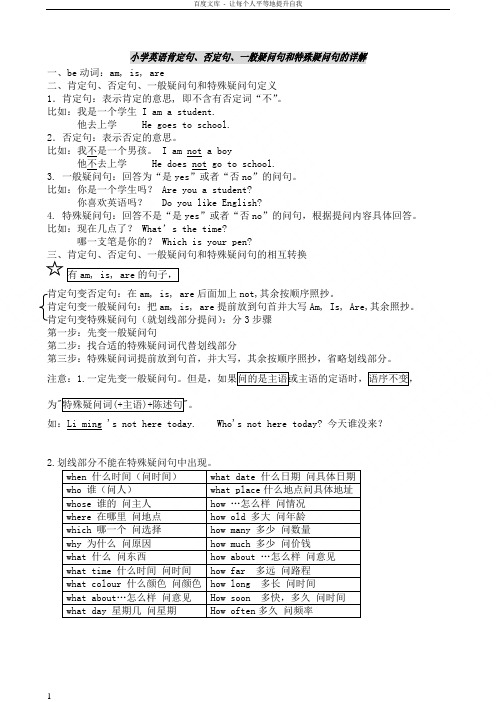
小学英语肯定句、否定句、一般疑问句和特殊疑问句的详解一、be动词:am, is, are二、肯定句、否定句、一般疑问句和特殊疑问句定义1.肯定句:表示肯定的意思, 即不含有否定词“不”。
比如:我是一个学生 I am a student.他去上学 He goes to school.2.否定句:表示否定的意思。
比如:我不是一个男孩。
I am not a boy他不去上学 He does not go to school.3. 一般疑问句:回答为“是yes”或者“否no”的问句。
比如:你是一个学生吗? Are you a student?你喜欢英语吗? Do you like English?4. 特殊疑问句:回答不是“是yes”或者“否no”的问句,根据提问内容具体回答。
比如:现在几点了? What’s the time?哪一支笔是你的? Which is your pen?有am, is, are的句子,肯定句变否定句:在am, is, are后面加上not,其余按顺序照抄。
肯定句变一般疑问句:把am, is, are提前放到句首并大写Am, Is, Are,其余照抄。
肯定句变特殊疑问句(就划线部分提问):分3步骤第一步:先变一般疑问句第二步:找合适的特殊疑问词代替划线部分第三步:特殊疑问词提前放到句首,并大写,其余按顺序照抄,省略划线部分。
注意:1.一定先变一般疑问句。
但是,如果问的是主语或主语的定语时,语序不变,为"特殊疑问词(+主语)+陈述句"。
如:Li ming 's not here today. Who's not here today? 今天谁没来?2.when 什么时间(问时间)what date 什么日期问具体日期who 谁(问人)what place什么地点问具体地址whose 谁的问主人how …怎么样问情况where 在哪里问地点how old 多大问年龄which 哪一个问选择how many 多少问数量why 为什么问原因how much 多少问价钱what 什么问东西how about …怎么样问意见what time 什么时间问时间how far 多远问路程what colour 什么颜色问颜色how long 多长问时间what about…怎么样问意见How soon 多快,多久问时间what day 星期几问星期How often多久问频率例如:1.肯定句、否定句和一般疑问句的互换肯定句:This is a book.否定句:This is not a book.一般疑问句:Is this a book?肯定回答:Yes, it is.否定回答:No, it isn’t.2.就划线部分提问(变特殊疑问句)This is a book.第一步:变一般疑问句 Is this a book?第二步:找合适的特殊疑问词 Is this what ?特殊疑问词提前放到句首,并大写,其余按顺序照抄,省略划线部分。
小学英语肯定句、否定句、一般疑问句和特殊疑问句的详解

小学英语肯定句、否定句、一般疑问句和特殊疑问句的详解一、be动词:am, is, are二、肯定句、否定句、一般疑问句和特殊疑问句定义1.肯定句:表示肯定的意思, 即不含有否定词“不”。
比如:我是一个学生 I am a student.他去上学 He goes to school.2.否定句:表示否定的意思。
比如:我不是一个男孩。
I am not a boy他不去上学 He does not go to school.3. 一般疑问句:回答为“是yes”或者“否no”的问句。
比如:你是一个学生吗? Are you a student?你喜欢英语吗? Do you like English?4. 特殊疑问句:回答不是“是yes”或者“否no”的问句,根据提问内容具体回答。
比如:现在几点了? What’s the time?哪一支笔是你的? Which is your pen?肯定句变否定句:在am, is, are can后面加上not,其余按顺序照抄。
肯定句变一般疑问句:把am, is, are can提前放到句首并大写Am, Is, Are,其余照抄。
特别注意有I We 改为YOU,Are you 问 Iam 或we are 答Are you a teacher? Yes,I am. Are you students? Yes,we are.2.非单三时用do, 单三时用does肯定句:I like English.否定句:单三肯定句:He likes English.like English?否定句:like English.3.动词过去式的句子分两类,was\were 和动词过去式有 was,were 改为否定句,直接在后面加 not ,改为一般疑问句把was were 直接提前,有 I we 改为 youI was a teacher.I was not a teacher.Were you a teacher?Yes,I was.有动词过去式,改为否定句加didn’t ,过去式还原。
一般疑问句及特殊疑问句总结(针对小学阶段学生)
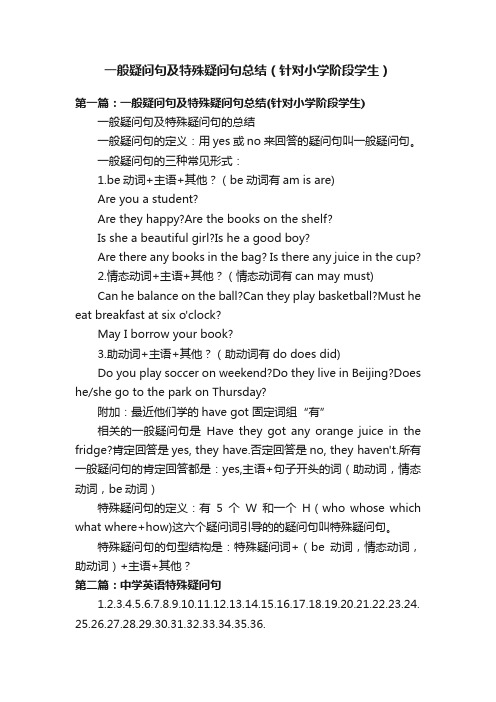
一般疑问句及特殊疑问句总结(针对小学阶段学生)第一篇:一般疑问句及特殊疑问句总结(针对小学阶段学生) 一般疑问句及特殊疑问句的总结一般疑问句的定义:用yes或no来回答的疑问句叫一般疑问句。
一般疑问句的三种常见形式:1.be动词+主语+其他?(be动词有am is are)Are you a student?Are they happy?Are the books on the shelf?Is she a beautiful girl?Is he a good boy?Are there any books in the bag? Is there any juice in the cup?2.情态动词+主语+其他?(情态动词有can may must)Can he balance on the ball?Can they play basketball?Must he eat breakfast at six o'clock?May I borrow your book?3.助动词+主语+其他?(助动词有do does did)Do you play soccer on weekend?Do they live in Beijing?Does he/she go to the park on Thursday?附加:最近他们学的have got 固定词组“有”相关的一般疑问句是Have they got any orange juice in the fridge?肯定回答是yes, they have.否定回答是no, they haven't.所有一般疑问句的肯定回答都是:yes,主语+句子开头的词(助动词,情态动词,be动词)特殊疑问句的定义:有5个W和一个H(who whose which what where+how)这六个疑问词引导的的疑问句叫特殊疑问句。
特殊疑问句的句型结构是:特殊疑问词+(be动词,情态动词,助动词)+主语+其他?第二篇:中学英语特殊疑问句1.2.3.4.5.6.7.8.9.10.11.12.13.14.15.16.17.18.19.20.21.22.23.24.25.26.27.28.29.30.31.32.33.34.35.36.What subject do you like? Ilike English/Chinese/Math/history etc.What school are you in? I am in NO.6 middle school.What’s your favorite subject? My favorite subject is English.What animal do you like? I like dogs/cats/sheep etc.What sport can you do? I can play basketball/football/badminton/volleyball etc.How mangy people are there in your family? There are four people in my family.How do you go to school? I go to school on foot/by car/by bus etc.How many English lessons do you have a week? I have 6 English lessons a week.What do you usually do after school? I usually do my homework, watch TV, play computer games after school.When do you go to bed every day? I go to bed at 9 o’clock.What do you do before sleep? I read books before slee p.When’s your birthday? My birthday is on June the 19th.How many months are there in a year? There are 12 months in a year.What’s your favorite holiday? My favorite holiday is summer holiday.How many seasons are there in a year? There are 4 seasons in a year.What season do you like best? I like summer best.What do American children do on Christmas? They will go shopping and buy lots of gifts and decorate their houses.What do you usually do at the weekends? I usually do my homework and play games with my fri ends.What do you do on Children’s day? I play games with my friends and have a big dinner with my parents.What present do you want to get on Children’s Day? I want to get an English dictionary on Children’s Day.What’s your father’s job? My father is an off icer.Where is your home? My home is in Macao.Which floor do you live? I live on the second floor.What do you usually buy when you go to supermarket? I usually buy some delicious food and fruit.Withwhom you often play table tennis? I often play table tennis with my father.What do you like doing at the PE lessons? I like playing football and basketball.What do you usually do after lunch? I usually have a sleep after lunch.What food do you like? I like KFC.What time do you usually go to school? I usually go to school at 7:00.How does your father go to work? He goes to work by car.What will you do when you grow up? I want to be an English teacher when I grow up.What will you do if you have 5,000,000 yuan? I want to travel around the world and buy a villa in the countryside.Which do you prefer, country life or city life? I like country life because it is more comfortable.What’s the motto of Olympic? Faster, higher, stronger.What’s Hangzhou famous for? West Lake.Which country do you want to go first if you have a lot of money? I want to go to Canada.第三篇:反义疑问句特殊用法总结1.当陈述部分的主语是I,而句子又用来征询对方的意见时,附加疑问句中的主语用you。
肯定句、否定句、一般疑问句和特殊疑问句
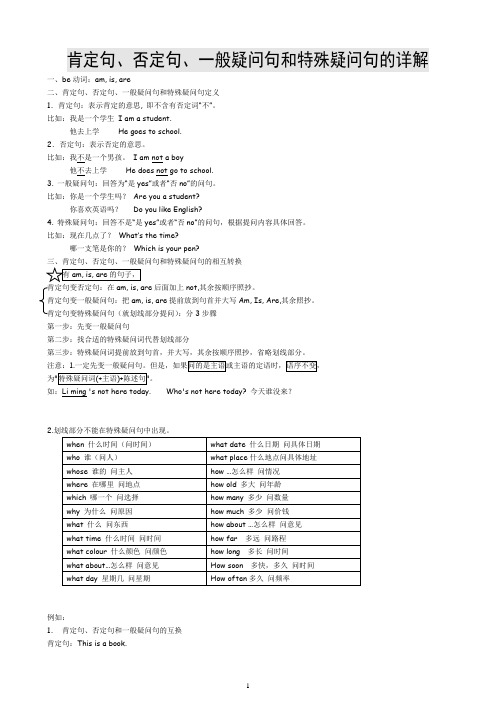
肯定句、否定句、一般疑问句和特殊疑问句的详解一、be动词:am, is, are二、肯定句、否定句、一般疑问句和特殊疑问句定义1.肯定句:表示肯定的意思, 即不含有否定词“不”。
比如:我是一个学生I am a student.他去上学He goes to school.2.否定句:表示否定的意思。
比如:我不是一个男孩。
I am not a boy他不去上学He does not go to school.3. 一般疑问句:回答为“是yes”或者“否no”的问句。
比如:你是一个学生吗?Are you a student?你喜欢英语吗?Do you like English?4. 特殊疑问句:回答不是“是yes”或者“否no”的问句,根据提问内容具体回答。
比如:现在几点了?What’s the time?哪一支笔是你的?Which is your pen?三、肯定句、否定句、一般疑问句和特殊疑问句的相互转换有am, is, are的句子,肯定句变否定句:在am, is, are后面加上not,其余按顺序照抄。
肯定句变一般疑问句:把am, is, are提前放到句首并大写Am, Is, Are,其余照抄。
肯定句变特殊疑问句(就划线部分提问):分3步骤第一步:先变一般疑问句第二步:找合适的特殊疑问词代替划线部分第三步:特殊疑问词提前放到句首,并大写,其余按顺序照抄,省略划线部分。
注意:1.一定先变一般疑问句。
但是,如果问的是主语或主语的定语时,语序不变,为"特殊疑问词(+主语)+陈述句"。
如:Li ming 's not here today.Who's not here today? 今天谁没来?2.划线部分不能在特殊疑问句中出现。
when 什么时间(问时间)what date 什么日期问具体日期who 谁(问人)what place什么地点问具体地址whose 谁的问主人how …怎么样问情况where 在哪里问地点how old 多大问年龄which 哪一个问选择how many 多少问数量why 为什么问原因how much 多少问价钱what 什么问东西how about …怎么样问意见what time 什么时间问时间how far 多远问路程what colour 什么颜色问颜色how long 多长问时间what about…怎么样问意见How soon 多快,多久问时间what day 星期几问星期How often多久问频率例如:1.肯定句、否定句和一般疑问句的互换肯定句:This is a book.否定句:This is not a book.一般疑问句:Is this a book?肯定回答:Yes, it is.否定回答:No, it isn’t.2.就划线部分提问(变特殊疑问句)This is a book.第一步:变一般疑问句Is this a book?第二步:找合适的特殊疑问词Is this what ?第三步:特殊疑问词提前放到句首,并大写,其余按顺序照抄,省略划线部分。
- 1、下载文档前请自行甄别文档内容的完整性,平台不提供额外的编辑、内容补充、找答案等附加服务。
- 2、"仅部分预览"的文档,不可在线预览部分如存在完整性等问题,可反馈申请退款(可完整预览的文档不适用该条件!)。
- 3、如文档侵犯您的权益,请联系客服反馈,我们会尽快为您处理(人工客服工作时间:9:00-18:30)。
小学语法—疑问句一、疑问句的分类疑问句就是提出疑问的句子。
分为:一般疑问句、特殊疑问句、选择疑问句和反意疑问句四种。
小学阶段不涉及反意疑问句和选择疑问句。
二、一般疑问句以Be动词,情态动词,助动词开头的疑问句,叫一般疑问句。
回答一般用“yes/no”来回答。
读的时候语音音调要上扬。
一般疑问句的结构:构成一般疑问句回答1Be动词在前Is he your father?Yes,he is/No,he isn´t Was she at home yesterday?Yes,she was/No,she wasn´t Are you at home?Yes,I am/No,I am not2情态动词在前Can you play the piano?Yes,I can/No,I can´t Could you do your homework?Yes,I can/No,I can´t3助动词在前Do you do your homework?Yes,I do/No,I don´tDoes she do her homework?Yes,she does/No,she doesn´t Did you do your homework?Yes,I did/No,I didn´tWill you do your homework?Yes,I will/No,I won´tIs she doing her homework.Yes,she is/No,she isn´t注意:回答一般疑问句时,肯定回答用“yes”,否定回答用“no”。
紧跟着的是人称(一般是代词),最后是一般疑问句的第一个词,如果是“no”否定回答还要把它加上not。
eg:Did you do your homework?你做作业了吗?Yes,I did/No,I didn´t(√)是的,我做了/不,我没有Yes,I didn´t(×)No,I did(×)Yes,I do(×)No,I doesn´t(×)三、肯定句如何变一般疑问句肯定句变一般疑问句与改成否定句窍门差不多,也是去找谓语(主要动词),再变化,遇到some要变成any。
另外人称需要变化,如果是一人称要变二人称,二人称要变一人称,第三人称不变。
(1)如果主要动词是Be动词,就直接提到句首,然后变人称,句尾加问号“?”。
eg:I am a student.我是学生。
(变一般疑问句)-Are you a student?你是学生吗?-Yes,I am/No,I am notMike is a student.迈克是个学生。
-Is Mike a student?迈克是个学生吗?Yes,he is/No,he isn´t(2)没有Be动词,就找情态动词,找到后就直接提到句首,然后变人称,句尾加问号“?”。
eg:I can speak English.我会说英语。
(变一般疑问句)-Can you speak English?你会说英语吗?-Yes,I can/No,I can´t(3)无Be动词和情态动词,就找实意动词,如是原形,就把助动词Do提到句首;如是单三,就把助动词Does提到句首;如是过去式,就把助动词Did提到句首;提到句首之后,把实意动词还原。
然后变人称,句尾加问号“?”。
eg:I do my homework.我做我的家庭作业。
(变一般疑问句)-Do you do your homework?你做作业吗?Yes,I do/No,I don´tHis father works hard.他父亲工作努力。
(变一般疑问句)Does his father work hard?他父亲工作努力吗?Yes,he does/No,he doesn´tHe did his homework in the classroom.他在教室里做作业。
Did he do his homework in the classroom?他在教室里做作业吗?Yes,he did/No,he didn´t(4)上面都没找到,只能找助动词了,找到后就直接提到句首。
然后变人称,句尾加问号“?”。
eg:We will go to school tomorrow.我们明天将要去上学。
(变一般疑问句)Will you go to school tomorrow?你明天去上学吗?Yes,I will/No,I won´t(5)在变一般疑问句时,遇到some要变成any哦。
eg:She is buying some food in the supermarket.(变一般疑问句)她正在超市买些食物。
Is she buying any food in the supermarket?她在超市买东西吗?Yes,she is/No,she isn´t肯定句变一般疑问句小口诀有Be就把Be提前没Be就把情态看找到情态往前站没情没Be找助动动原需把Do提前动单需把Does提前动过需把Did提前提前之后动还原如果句中遇someany要把some换找到助动怎么办直接把它提到前四、特殊疑问句特殊疑问句以特殊疑问词开头,对句中某一成分提问的句子叫特殊疑问句。
因此,它不能用“yes和no”来回答,需要作出具体回答。
常见的特殊疑问词有:类型疑问词汉语意思疑问代词what什么Which+名词哪个,哪些Whose+名词谁的who谁(主格)whom谁(宾格)疑问副词when何时where何地how怎么样why为什么特殊疑问词组How many+名词复数多少(跟可数名词复数)How much+不可数名词问价格/多少(跟不可数名词)How old多少岁How long多长How about/What about怎么样How tall多高How heavy多重How big多大How soon多久How far多远How often多久一次What colour什么颜色What day星期几What date什么日期What time什么时间Which season问季节特殊句式what do/does……looklike?what be……like?对相貌特征提问对性格提问What is the weatherlike…?或how is theweather…?对天气提问用特殊疑问句的结构:特殊疑问词+一般疑问句eg:what do you want?你想要什么?How many students are there in your class?你们班有多少学生?五、划线部分提问(如何变特殊疑问句)提问步骤:第一步:用正确的特殊疑问词代替划线部分。
第二步:把疑问词移到句首。
第三步:把剩下的部分变成一般疑问句(但对主语与定语提问时除外)第四步:变好之后加在疑问词后面。
特殊疑问词需根据划线内容来确定:参考上面表格●划线部分是“事或物”,特殊疑问词用what。
●划线部分是“人”,特殊疑问词用who。
●划线部分是“地点”,特殊疑问词用where。
●划线部分是“时间”,特殊疑问词用when/what time。
●划线部分是“年龄”,特殊疑问词用how old。
●划线部分是“职业”,特殊疑问词用what。
●划线部分是“颜色”,特殊疑问词用what colour。
●划线部分是“数量”,特殊疑问词用how many/how much。
●划线部分是“多少钱”,特殊疑问词用how much。
●划线部分是“形容词物主代词/名词所有格”,特殊疑问词用whose。
(1)对主语提问,将主语划线部分替换为对应的特殊疑问词即可,其余照抄。
eg:Lily is my good friend.莉莉是我的好朋友。
(划线部分提问)Who is my good friend?My bike is under the tree.我的自行车在树下。
(划线部分提问)What is under the tree?(2)对谓语(动词部分)提问,划线部分要用what代替,把划线部分剩下的部分变成一般疑问句,加在what后面,用do/doing/done代替对应的划线动词。
句尾加问号“?”eg:I eat an apple.我吃了一个苹果。
(划线部分提问)What do you do?She does her homework.她做家庭作业。
(划线部分提问)What does she do?They are playing football.他们正在踢足球。
(划线部分提问)What are they doing?They went to the park last week.他们上周去公园了。
(划线部分提问)What did they do last week?I will go to school tomorrow.我明天要去上学。
(划线部分提问)What will you do tomorrow?(3)如果划线部分是定语,并且紧跟谓语部分,需将特殊疑问词和紧跟其后的名词一起提到句首。
把剩下的部分变成一般疑问句,加在疑问词后面。
句尾加问号“?”eg:This is his book.这是他的书。
(划线部分提问)Whose book is this?I like the red one.我喜欢红色的那个。
(划线部分提问)Which one do you like?There are forty-five students in my class.(划线部分提问)我们班有四十五个学生。
How many students are there in your class?你们班有多少学生?(4)如果对其他成分提问,先根据划线部分确定疑问词,然后去掉划线部分,把剩下的部分变成一般疑问句,加在疑问词后面。
句尾加问号“?”eg:The girl is singing in the classroom.(划线部分提问)这个女孩正在教室里唱歌。
Where is the girl singing?It´s ten o´clock.现在是十点钟。
(划线部分提问)What time is it?I like winter best.我最喜欢冬天。
(划线部分提问)Which season do you like best?(5)特殊类型eg:It's sunny today今天天气晴朗。
(划线部分提问)What is the weather like today?或How is the weather today?He is tall and thin.他又高又瘦。
